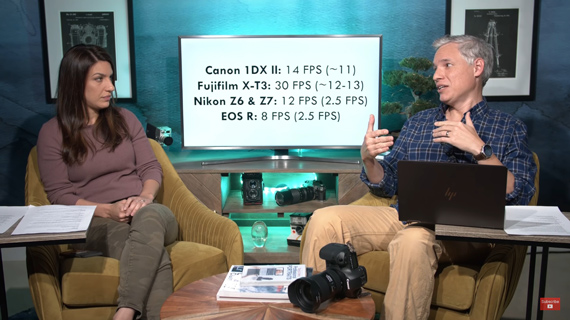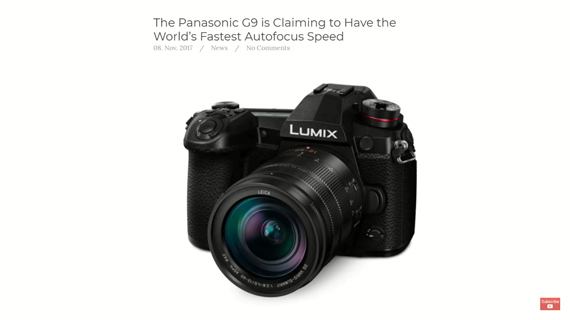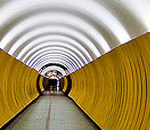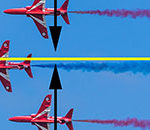Every time a camera manufacturer comes up with a new camera, they make it sound like the old one is obsolete. They make you feel like you need their latest camera model to take great photos. More megapixels, better ISO performance, faster AF. Chelsea and Tony Northrup discuss five “lies” camera companies tell to sell cameras:
Silent Mode
When the Canon 5D Mark II came out, the company promoted silent mode as the product’s unique selling point. Many wildlife and wedding photographers were fascinated to know about the feature. But in reality, the silent mode isn’t at all silent. As Tony demonstrates, it just makes a different noise.
Megapixels
Megapixels are probably the first thing that camera manufacturers boast of when marketing their cameras. Many users also believe that higher megapixels are better. But, a higher megapixel camera won’t necessarily yield an image with greater details. This is dependent on other factors as well:
Lens Quality Affects Resolution
The quality of a lens also dictates how detailed the images turn out. But camera manufacturers take this factor out of the equation when promoting their cameras. To add to that, the kit lens that they box with the camera is usually of low quality and does no justice to the sensor’s resolution.
“If you had an optically perfect lens, you’d get the number of megapixels you hoped for. It’s like the theoretical maximum after you subtract out flaws of the lens.”
Bayer Filter and Resolution
Every sensor today has a Bayer filter for color information. A Bayer filter has an array of Red, Blue, and Green filters. If a sensor is 24 megapixels, it’s made up of 12 megapixels of green, 6 megapixels of red, and 6 megapixels of blue. So, if you photograph a subject that has light from all frequencies of the spectrum, you can expect to get the full amount of detail. But if your subject is dominated by one of the primary RGB colors, then you lose a whole lot of detail.
As Chelsea shares, if you photograph a blue sky using a 24 megapixel camera, you only utilize the 6 megapixels of blue.
“It’s dropping three out of four pixels of light completely if you’re photographing something with primary color.”
4K
All camera manufacturers have been marketing their cameras’ 4K video capabilities. And consumers demand it. Looking from an engineering perspective, 4K contains a lot of data, and that can be difficult for small cameras to handle. The GoPro Hero4 had 4K at 15 frames per second when it came out. Even the Sony a6300 had trouble handling such huge information which eventually caused it to overheat when shooting at 4K.
To overcome the data handling issue, the Canon 5D Mark IV does 4K at a 1.7x crop even though it’s a full frame camera. This has caused a loss in the quality of the footage. What a compromise for the sake of a feature!
Frames Per Second
Boasting how their camera is fast and can shoot X frames per second is another thing manufacturers are not shy of doing. They claim that the camera is great for sports, action, and wildlife photography. But there’s a catch.
Most cameras that supposedly feature higher frames per second can only achieve the maximum fps without focus tracking. So this is only useful if you just want a ton of frames that are out of focus, or if you’re shooting something that’s not moving. But again, why would you shoot a whole lot of frames for a stationary subject? And then there’s the viewfinder blackout factor. If you want a live view, the frames per second drop down drastically from the quoted rate. Yet another exaggeration.
World’s Fastest Autofocus
This is a statement that many camera manufacturers come up with. But only they know how they measure the speed of focusing. There’s no standardized scientific measurement to determine which camera focuses fast. All cameras are fast to focus these days. But the way every brand claims that their camera has the world’s fastest autofocus without any standard test makes this a shady statement.
“How will we know when the world’s fastest autofocus actually happens?”
Have you fallen for any of these half-truths that camera brands tell? Let us know.
Like This Article?
Don't Miss The Next One!
Join over 100,000 photographers of all experience levels who receive our free photography tips and articles to stay current:









Not sure about canon but D850 silent mode rocks so I disagree with silent mode view.
Mega pixels also do matter
The Nikon D850 has a true silent mode. I’ve used it. It’s awesome. The only downside is having to use Live View since there’s no EVF. But it -does- exist, it’s just on the mk IV.
Kit lenses are not “usually” of low quality. If you want to cast aspersions, do so accurately and precisely. Case in point: the “kit” lens for the D750 and D850 is the 24-120 f/4, and (it turns out) it’s a pretty awesome lens. Even the Nikon DX 18-55 is serviceable, hardly “low” quality.
Things in nature are rarely a primary color. Including the sky. Which makes the comment about pixels kind of… specious.
Newsflash: Canon has a 1.6 crop factor, not 1.7. Do you mean to say that, for 4K recording, the camera uses the center 4K by 2160 area? Nothing wrong with that… and it’s still 4K. The only issue is that it’s actual pixel resolution, not sampled across the frame. And that will require -less- processing power because the camera doesn’t have to down-sample. Yes, it would change the way one framed shots because of the smaller view angle. But it’s not going to results in a loss of quality. On the contrary, it’s should be better because no interpolation of the samples pixels occurs.
Newsflash: NIkon at 6.5 (D750) or 7 (D850 can handle focus tracking. Maybe that’s a problem for some brands, but saying it’s a problem for all cameras is… a disservice. Not to mention wrong. And the, um, viewfinder blackout? What are you talking about? Is that a mirrorless system problem? If you refer to something, could you please be precise and non-obfuscated?
Another typically errant commentary by the Northrups. This is the kind of tripe that belongs on FStoppers, not PictureCorrect.